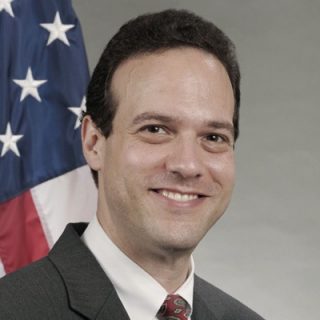
Careers inside the Beltway can last decades, even span an individual’s entire career from entry-level to retirement. But for these executives, there came a moment when they instead wanted out of the Beltway and along the Technology Corridor of 66-West. Transitioning from a long career in public service to one more quiet and out of the public eye is a decision many are making.
Former Chief Information Officer at the Dept. of Commerce Dr. Simon Szykman, now the Chief Technology Officer in the Federal Services Division at Attain, explains what led him to leave the government side for the private sector, addresses his new role and offers advice for others thinking of making the switch.
WashingtonExec: Your career in government spans two decades. How is your transition going? What do you know now that you did not expect after leaving public service?
Dr. Simon Szykman: The transition has been going very well so far, without a hitch. I have a good number of friends who work in the private sector, so I’m not sure I would say that there’s anything I now know that I didn’t expect upon leaving. There are some definite distinctions between the world in which I operate now versus that in my government CIO role. Most notable is the speed at which decisions get made and actions are taken. Attain, where I currently work, is a mid-sized company. There are fewer individuals involved in decision-making, fewer competing interests and less bureaucracy. The pace of motion is much more brisk, and it’s very pleasant to not have to overcome significant amounts of inertia to move forward in productive directions.
The biggest learning curve I have faced thus far is learning the full scope of Attain’s portfolio of services, clients and programs. Understanding what we do, how we do it, where are strengths are and projecting that against longer term trends, are essential to being able to position the company for continued success in the future.
WashingtonExec: What prompted you to continue to support the mission in a private sector role?
Dr. Simon Szykman: Until my latest move, I had spent my entire career in the federal government. I spent the first half of my career in the science and technology world, where I worked in a variety of roles ranging from doing research and development, to managing cybersecurity R&D programs at DHS, to science and technology policy work. At that point in my career, I decided I was interested in moving into a more operational environment, which led to my move to become CIO at NIST, and subsequently, the Commerce Department.
While those are certainly roles that involve business leadership (managing technology strategy, budgets, people and operations), after several years, I realized that the one area of experience that I had not been exposed to in government service was the real business side of IT. My decision to move to the private sector was largely driven by my desire for learning opportunities and further career development. Given my long background in the federal government, continuing to support federal agencies from the industry side was a natural move for me.
WashingtonExec: What would your colleagues say were your top three accomplishments while at the Dept. of Commerce? What do you consider your top three accomplishments while at the Dept. of Commerce?
Dr. Simon Szykman: I’d like to hope that my colleagues and I would agree on what my top three accomplishments at DoC were. The first was significantly improving the cybersecurity posture at the Department. When I began my role as CIO at Commerce, the Department had been under a material weakness in cybersecurity for roughly a decade. About a year after my arrival, we were able to eliminate the material weakness and had embarked on a path for broad and significant improvements in cybersecurity. We overhauled the Department’s cybersecurity risk management framework, strengthened policies and the Department’s cybersecurity programs, and over time, secured funding to implement a Department-wide continuous monitoring system.
The second notable accomplishment was working in conjunction with Scott Quehl, the Department CFO at the time, to establish a strategic sourcing program at Commerce. Our initial focus was on establishing a Department-wide contract for purchasing PCs, which replaced more than a hundred contracts that had previously been in place for purchasing what is recognizably a commodity product at a savings of 30 to 35 percent for each PC purchased. We then moved on to establish strategic sourcing contracts for purchasing a variety of other commodities, including Adobe software, security software and networking hardware. These strategic sourcing contracts have been documented as saving millions of dollars of IT spending.
The third major accomplishment that I’m proud of is establishing a dialogue around the importance of IT portfolio management. This led to a significant rethinking of how IT and related spending ware managed at Commerce and led to the Acting Secretary signing out a Commerce Policy on IT Portfolio Management. Focusing on managing IT more holistically and cooperatively led to a number of shared services initiatives both within the Department’s bureaus, as well as across multiple bureaus.
WashingtonExec: What will be your biggest challenge as a Chief Technology Officer for Federal Services at Attain? How will you address it?
Dr. Simon Szykman: The key challenge that I’ll be facing is providing strategic technology leadership to a rapidly growing company as it continues to grow and mature. As the company does not yet have a centralized solutioning organization, one of my roles is to establish internal competency groups to improve collaboration, sharing of information and best practices, and to help leverage the entirety of the company’s technical capacity in pursuing new opportunities.
I am also responsible for the company’s alliances with key technology partners and growing that set of partners in a strategic way that will better enable us to design and deliver solutions to our clients. The biggest learning curve I have faced thus far is learning the full scope of Attain’s portfolio of services, clients and programs. Understanding what we do, how we do it, where are strengths are and projecting that against longer term trends, are essential to being able to position the company for continued success in the future.
WashingtonExec: What has been the largest learning curve or adjustment you have had to make in the private sector?
Dr. Simon Szykman: The biggest learning curve I have faced thus far is learning the full scope of Attain’s portfolio of services, clients, and programs. Understanding what we do, how we do it, where are strengths are, and projecting that against longer term trends, are essential to being able to position the company for continued success in the future.
WashingtonExec: Do you believe a public sector executive’s top leadership qualities differ from a private sector executive’s leadership qualities? If so, how?
Dr. Simon Szykman: While one’s skills and domain knowledge are shaped by one’s background and differ among those who have spent time predominantly in the government or in the private sector, I believe that the leadership qualities in both communities are largely the same. These include the ability to think strategically, communicate effectively, build consensus, develop relationships and establish trust in those relationships, establish priorities and goals, and motivate others to work to achieve desired outcomes.
WashingtonExec: Did you have any mentors or individuals who deeply influenced who you are or your decision to stand at the head of where you are now?
Dr. Simon Szykman: Earlier in my career, I was working in a position in the Executive Office of the President when an opportunity to move to a new position at another agency. I spoke to a friend and colleague who was very much a mentor to me about the dilemma I was facing. I explained that I was interested in the new opportunity, but that I also felt like I was making an valuable difference where I was, serving in a role that was influential for important policy decisions that were being made in The White House.
In reference to my thoughts about staying in the role I occupied at the time, he asked me “What are you getting out of it?” – not meaning it as selfishly as it sounds out of context, but rather trying to get me to look at it from the perspective of that position being one stop in a longer term career progression. Upon considering his question, I realized that while I could continue to make a difference where I was, I had probably gotten all that I was going to get out of the position in terms of personal and career development, so I decided to move on to a new opportunity that would allow me to further develop my management and leadership skills.
That same question is one that I have asked myself numerous times since then during my career, and it has helped guide me in decisions about how and when to continue down the career path that I have been on since that time, including my most recent decision to leave government service for the private sector.
WashingtonExec: What is your best piece of advice to those thinking about remaining in federal or enter the private sector?
Dr. Simon Szykman: Think about what motivates you, and let that guide your decisions about your career path. When I moved from my position as NIST CIO to become the CIO at the Commerce Department, I moved to a position where I had a smaller budget and fewer people working for me, but where I could continue to expand my leadership skills and make a broader difference. In my move from that role to my current one, I stepped into a position where I don’t have a staff or budget to speak of, but one where I serve in an important leadership role and where I can continue to round out my experience by learning a great deal about the business side of IT. Had I been more motivated by the size and scope of the organization I was responsible for, I might still be serving as NIST CIO, or I might have taken a path to another agency where I had responsibility for a larger budget and staff, or I might ultimately have moved to the private sector but to a different role and company.
There is no right or wrong answer, but I would say that it’s important to contemplate what will provide one with the greatest motivation and intrinsic satisfaction, and let those things help make decisions about when it’s time to seek out new opportunities, and which ones to pursue. And echoing the perspective offered to me by my mentor, I would suggest that it’s important to understand what you are getting out of your current position and what you believe you would get out of a new opportunity, to ensure that you are continuing to develop personally and professionally as you move through your career.
WashingtonExec: Do you see yourself “boomeranging back” to the public sector?
Dr. Simon Szykman: It’s certainly a possibility that could happen at some point, but I haven’t made any plans – even long term ones – to that effect. While I may eventually return to government service, having just left government a few months ago it’s too early for me to be contemplating anything like that at this time.
WashingtonExec: What’s something most people don’t know about you?
Dr. Simon Szykman: I have a strong sense of adventure and like to push myself out of my comfort zone. I’ve climbed Mount Kilimanjaro, flown (not just flown in, but flown) a stunt plane, stood on the wing of a biplane while it was performing acrobatics, been skydiving and jumped off a building from a height of more than 800 feet with a thin steel cable harnessed to my back. Bungie jumping is still on my to-do list, but I’m sure I’ll get to trying that at some point.


